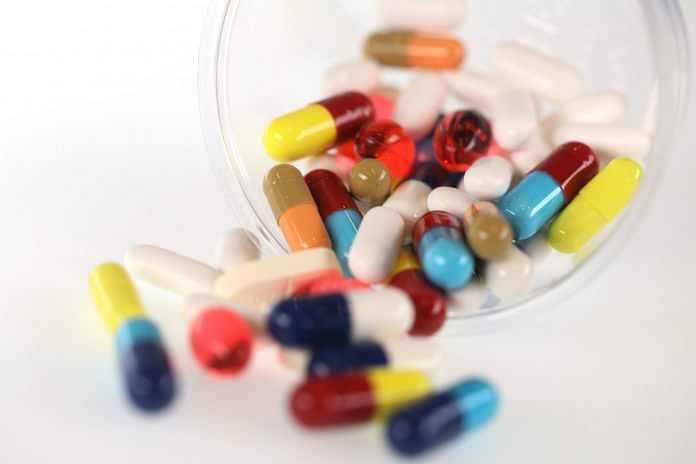New Delhi: The Narendra Modi government is likely to announce final guidelines for its Production Linked Incentive (PLI) Scheme, meant to boost domestic manufacturing of active pharmaceutical ingredients (API), this month, ThePrint has learnt.
The government had, in March, approved the PLI Scheme to reduce India’s dependence on China for raw materials to produce crucial antibiotics, anti-HIV drugs, vitamins, and cardio medicines. The scheme comes with financial implications worth Rs 6,940 crore for the next eight years.
Authorities have already reached out to over 600 manufacturers of APIs and other raw materials, such as intermediaries and key starting ingredients.
The minimum requirements for the scheme, eligibility criteria and categorisation of incentives are under development. It will give incentives to 136 selected manufacturers.
On June 11, the Central Drugs Standard Control Organisation (CDSCO) — a wing of the Ministry of Health and Family Welfare that is leading the scheme and forming its guidelines — had invited pharmaceutical companies for a meeting via video-conference.
“We have taken the suggestions from pharmaceutical companies. They will be considered while drafting the final guidelines which will be released before the end of this month,” a senior official told ThePrint, requesting anonymity.
Also read: Indian drugmaker Lupin voluntarily recalls metformin variant, a diabetes drug, in US
What is PLI Scheme and its likely guidelines
The government’s move was triggered after supply chains were disrupted by the coronavirus outbreak in China, sparking fears of drug shortages in India. Indian drugmakers import around 70 per cent of their total bulk drug requirements from its eastern neighbour.
To fight this challenge, in the short- and long-term, the central government had formed a high-level committee in February to monitor the availability of raw materials.
This committee, led by Joint Drug Controller Dr Eswara Reddy, had recommended a list of incentives for API manufacturers to boost local production, ThePrint had earlier reported.
The criteria for selection, according to the draft guidelines accessed by ThePrint, include manufacturers who can ensure “higher production capacities” and use latest technologies that are less polluting such as “green chemistry, flow chemistry” for production.
The document also mentions that a firm’s “production cost should be low” and it should have “prior experience in manufacturing similar products”.
Incentives likely to be divided into four groups
Under the final guidelines, the scheme is likely to divide the pharmaceutical industry into four segments.
The first segment involves production of “four fermentation-based key starting materials (KSM) products” — that are used to manufacture top selling antibiotics, including penicillin and clavulanic acid. Eight beneficiaries will be chosen for a total incentive of Rs 3,600 crore, 20 per cent incentive to each player.
The second segment involves “10 fermentation-based niche KSMs and APIs products” including neomycin, gentamicin, vitamin B1, tetracycline, doxycycline and betamethasone. Here, 20 beneficiaries will be chosen for incentives worth Rs 1,000 crore, a total of 20 per cent to each player.
Under the third segment, which attracts incentives of Rs 960 crore for “4 chemical synthesis based KSMs or APIs products”, a 10 per cent incentive each will be given.
The last segment will attract incentives of Rs 1,380 crore for “23 chemical synthesis based KSMs and APIs products”, including cardio drug valsartan, atorvastatin, antibiotics ofloxacin, anti-HIV drug ritonavir and lopinavir, Vitamin B6 and aspirin. Each player will be given an incentive of 10 per cent.
The government will also announce the mandatory minimum production capacity under the scheme for each player. For instance, penicillin’s minimum production capacity is 5,000 metric ton, whereas for clavulanic acid it is 1.5 lakh kilogram.
From the date of releasing the notification to inviting applications, it will take at least 155 days — five months — for approval, enrollment under the scheme and start of production.
Also read: Don’t deny treatment to CGHS beneficiaries, Modi govt tells hospitals, warns of action




Thank you for sharing such cleanly written informative articles.